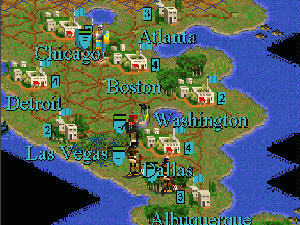Friday 7 March 2003

|
Pic of the day: Instead of elections, presidents should be selected by Civilization tournaments. Or chess. Or Go. Just as long as the stupid ones are weeded out before they get any power in the real world. Bushiness as usualProbably my favorite magazine ever is The Economist, a British weekly with a world outlook and favored by the rich and powerful across the world, plus me for some reason. Probably because it writes about just the things that interest me: Economy, politics, new science, and some culture. Things that change slowly, things that are partway predictable. It looks at the long lines, not the random details. Also I like that it treats all parts of the world the same way (except it has a special section about the UK, which is probably a tradition because that's where the magazine started). The Economist supported George W Bush during the American elections, and it still cheers on the war against Iraq. They believe (as do I) that Saddam Hussein is a threat to his own people and its neighbors. (It is very dubious that he is a threat against the USA, since he and the Muslim fundamentalists used to be arch enemies until the USA declared war on them both at the same time.) ***Even so, The Economist makes no excuses for parts of Bush's behavior. When it comes to civil liberties and due process, the Bush administration is compared to South Africa under the apartheid, and South Africa comes out the better. This is the strongest warning so far, but the magazine has repeatedly trashed the administration for ignoring basic rules of a civilized society, and warned that it is just growing worse and worse. In the latest issue (and web site) there is an article called Bush the Divider. When he became president (despite not being chosen by a majority of the voters) he promised to be a uniter, and he promised a foreign policy that was humble yet strong. These promises, says The Economist, lasted for about five minutes. He has done exactly the opposite of what he said, and he is unlikely to get away with it in the long run. True. For the last few months, Bush has repeated that he has not decided to wage war against Iraq. But hardly a soul believes him. Why should they? He is a habitual liar. Or perhaps he just deceives himself. Or perhaps he doesn't know what he is doing; after all, he is pretty dim for someone working with these complicated issues. (Though he is probably overqualified for making hamburgers, in all fairness. He is not retarded – he is nearly average, better in some things than others.) The short of it is, he says one thing and does another, and he does this on a regular basis. ***This could be one reason why other democratic nations are so cool to his grand vision of a Middle East filled with peaceful democracies, which he thinks could be the long term effect of a regime change in Iraq. Looking back at Bush's history, you will automatically ask yourself: "What is the opposite of this scenario?" First off, you cannot have a democratic Iraq, because Iraq is not a natural nation. There are at least three major ethnic groups that hate each other's guts. Unless you hold a gun to their heads, they will eagerly kill each other and wreck the country far more than a few bombs could do. So it's either a burning ruined country or an American colony patrolled by heavily armed and ruthless soldiers. This would be necessary for at least a generation. The idea of extending this to the rest of the Middle East is a nightmare the likes of which we have not seen since World War II. Or, in another perspective, since the Crusades. With all due respect for The Economist, I cannot see how they can continue to support a guy like that. Even if he means well, he has a track record of messing up. And now he is right on track again. |
Slush. |
Yesterday <-- This month --> Tomorrow?